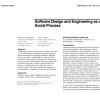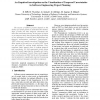927 search results - page 64 / 186 » Practical Limits on Software Dependability: A Case Study |
CHI
2007
ACM
14 years 10 months ago
2007
ACM
Traditionally, software engineering processes are based on a formalist model that emphasizes strict documentation, procedural and validation standards. Although this is a poor fit...
ISESE
2005
IEEE
14 years 4 months ago
2005
IEEE
The success of software projects depends on the ability of a human planner to understand the relationships of tasks and their temporal uncertainty and hence the visualization ther...
WER
1999
Springer
14 years 2 months ago
1999
Springer
In this article we defend the idea that social aspects have strong influence in the software requirements elicitation (Goguen 1993), which drive us to find help in the social scien...
ICSE
2009
IEEE-ACM
14 years 11 months ago
2009
IEEE-ACM
Superimposition is a composition technique that has been applied successfully in many areas of software development. Although superimposition is a general-purpose concept, it has ...
IEEEARES
2009
IEEE
14 years 5 months ago
2009
IEEE
The implementation of security principles, like least privilege, in a software architecture is difficult, as no systematic rules on how to apply them in practice exist. As a resu...


